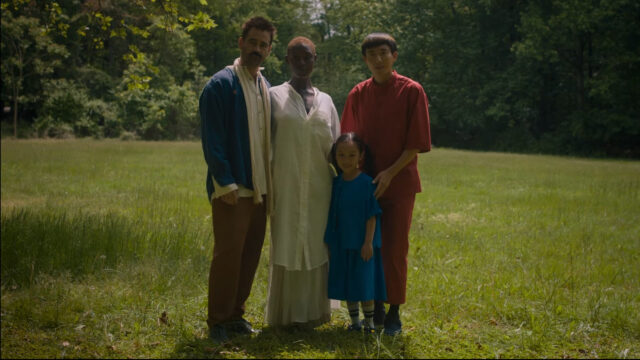After Yang: Future Considerations, by David Bax

Kogonada’s lovely feature debut, Columbus, was far more tender and messy than its imagery would suggest when presented out of context. Blending Midwestern modesty with imposing structures of modernist architecture, publicity stills made it look like something approaching science fiction. Now Kogonada has, if you like, fulfilled that promise. After Yang takes place an unspecified number of years from now (the implication is that it’s more distant than near). But still, for all his futuristic mise-en-scène, the director’s outlook remains poignantly human, psychological but not overly cerebral.
Kogonada has brought back one of the strongest weapons in Columbus‘ arsenal, Haley Lu Richardson. This time, she’s a mysterious woman who seems to have befriended the malfunctioning android of the title. And he’s filled out the rest of the cast with beautifully emotive actors like Jodie Turner-Smith, Sarita Choudhury and Clifton Collins Jr. (not to mention Jane the Virgin‘s Brett Dier as a one-scene wonder). But After Yang hangs chiefly on the sturdy shoulders of Colin Farrell.
Farrell’s Jake spends most of the film going from place to place, trying to figure out how to get Yang (Justin H. Min) repaired. The clock is ticking–Jake’s daughter (Malea Emma Tjandrawidjaja) misses her companion, plus the android’s organic flesh is going to start decomposing if he’s not fixed–but Jake isn’t frantic. That’s not to say he’s calm about it either but he moves deliberately and cautiously through a world in which his position is fragile; his business is struggling and part of his current predicament is the result of his having bought Yang secondhand. Tonally and texturally, After Yang seems to follow Jake’s lead. It’s quiet and delicate in the way of an ASMR video, with the softness of the sound design and the score by ASKA working in tandem to cast a hypnotic spell over the film.
Jake isn’t exactly in a relaxed state, though. The shame he feels because of his financial problems stifles him and informs the whole of his decision making. So accustomed to keeping secrets, he continues to hide developments in his search to fix Yang from the rest of his family.
Secrets and shame are the kinds of things that get passed on from generation to generation, not through the blood but through the very atmosphere shared by a family. Maybe that’s why Jake would prefer to look back in time rather than forward. Like many people who feel guilty about being in the upper middle class, he fetishizes the perceived simplicity and authenticity of the past. Jake owns a store that sells tea leaves he cultivates by hand himself. Yet the rest of his life, including his roles as husband and father, are dictated by digital systems, making his puritanically analog hobby seem more like an affectation.
But it would be superficial to dismiss it all like that. Through his tea business, Jake is also keeping an ancient tradition alive, valiantly maintaining permanence in a world where things–and people–are always ending. As an android, Yang doesn’t exactly serve the same purpose as the holograms in Michael Almereyda’s Marjorie Prime but I kept thinking of that film and its explorations of memory while watching After Yang anyway. Things, be they traditions, robots or anything else, live on longer than any individual person does. But Kogonada suggests that we can imbue these things with memories–individual, familial, cultural–that they can carry on and on with them into the future. All of us will die but some of us–some parts of us–can thus live forever.

























